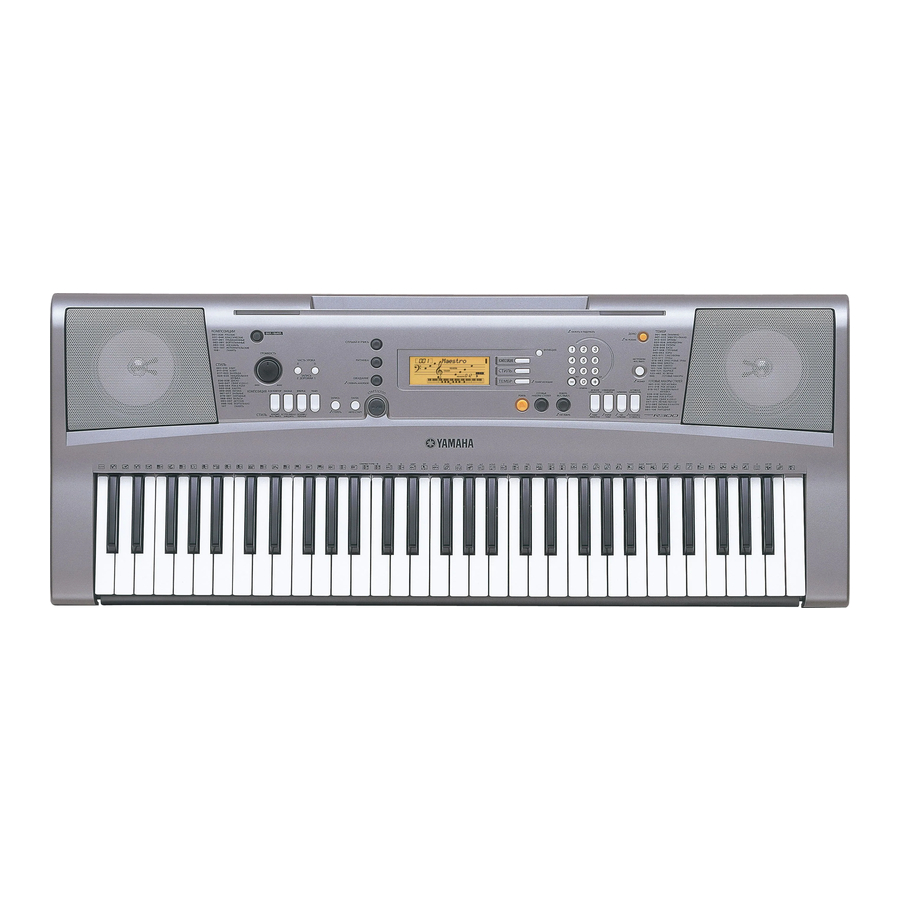Yamaha PortaTone PSR-R200 Manual del usuario - Página 3
Navegue en línea o descargue pdf Manual del usuario para Instrumentos musicales Yamaha PortaTone PSR-R200. Yamaha PortaTone PSR-R200 29 páginas. Yamaha portatone

BEFORE YOU BEGIN
Power Supply
Your PSR-200 or PSR-300 will run either from batteries or
an optional power adapter. Follow the instructions below ac-
cording to the power source you intend to use.
Using Batteries
Six 1.5V D size (SUM-1 or R-20) or equivalent batteries
must first be installed in the battery compartment.
Before replacing the batteries, make sure that the power is turned off.
During battery replacement the memory will be backed up for approxi-
mately 1 minute.
1.
Open the battery compartment cover located on the instru-
ment's bottom panel.
2.
Insert the six batteries, being careful to follow the polarity
markings on the cabinet.
3.
Replace the compartment cover, making sure that it locks
firmly in place.
* The included batteries are for testing purposes. Their service life might
be considerably shortened due to storage conditions, etc.
Caution:
1. When the batteries run down, replace them with a complete
set of six new batteries. NEVER mix old and new batteries.
2. Do not use different kinds of batteries at the same time.
3. In case electrolyte has leaked into the battery compartment,
wipe it off completely before installing new batteries.
4. To prevent possible damage due to battery leakage, remove
the batteries from the instrument if it is not to be used for an
extended period of time.
Auto Power OFF
To prevent unnecessary battery drainage, the PSR-200/PSR-
300 features an Auto Power OFF function that automatically
turns the power OFF if the instrument is not used for
approximately 10 minutes.
The Auto Power OFF function does not operate when the
PSR-200/PSR-300 is powered from an optional AC Power
Adaptor, as described below.
Using An Optional AC Power Adaptor
Plug the DC output cable from an optional Yamaha PA-3,
PA-4, or PA-40 AC Power Adaptor into the DC IN jack on the
rear panel of the PSR-200/PSR-300, then plug the AC Power
Adaptor into a convenient wall AC power socket.
The internal batteries are automatically disconnected when
an AC Power Adaptor is used. Disconnect the AC Power
Adaptor when not using your PSR-200/PSR-300.
Use ONLY a Yamaha PA-3, PA-4, or PA-40 AC Power Adaptor to
power your instrument from the AC mains. Other adaptors may
cause serious damage to your PSR-200/PSR-300.
Setting Up the Music Stand
Insert the bottom edge of the music stand into the slot
located at the rear of the PSR-200/PSR-300 control panel.
Maintenance
Location
Avoid exposure to direct sunlight or other sources of heat.
Never leave it inside a car where it can get very hot. It may
cause discoloration or deformation. Vibration, excessive
dust, cold, low or high humidity can also cause malfunction.
Handling
Avoid rough handling. Don't drop or jolt the PSR-200/300
as this can damage the internal circuitry. Pressing too hard
on keys or controls may lead to malfunctions. When cords
are plugged into the rear panel jacks, pay particular attention
not to apply excessive force to them since this may damage
the terminals.
Cleaning
Clean the exterior with a soft, dry cloth. Using chemical
solvents will damage the finish.
Interference Through Electromagnetic Fields
Do not use your PSR-200/300 close to television sets or
other equipment receiving electromagnetic signals as this
could cause interference noise in the other appliance.
Service and Modifications
Your PSR-200/300 contains no user serviceable parts.
Opening it or tampering with it in any way can lead to elec-
trical shock as well as damage. Refer all servicing to quali-
fied YAMAHA personnel.
YAMAHA is NOT responsible for damage caused
by improper use.
1
